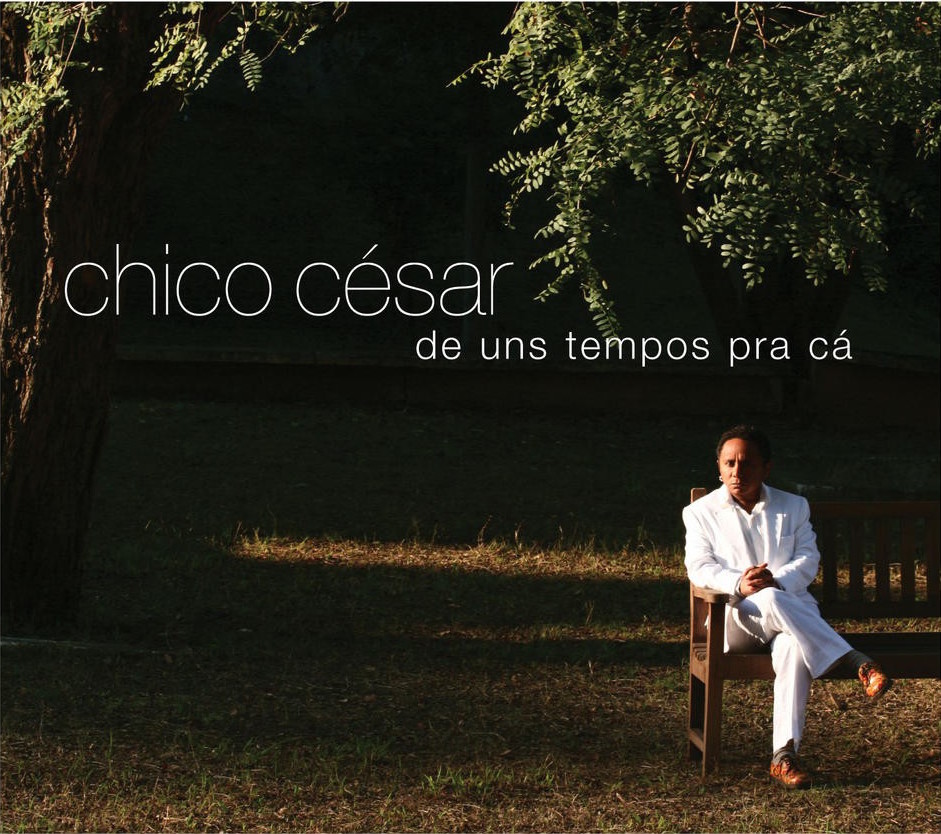De uns tempos pra cá me tornei um artista razoavelmente conhecido em alguns circuitos, dentro do meu país e fora dele. À minha revelia, mas também com minha anuência, determinados aspectos da música que faço se tornaram mais visíveis que outros. Não é que eu queira me queixar. Nem poderia, num momento em que uma das principais queixas de muitas pessoas (artistas inclusive) é a invisibilidade. Não de partes. Mas a invisibilidade total delas, e de sua produção. Ser em parte conhecido, visível, ou conhecido em partes já aparenta alguma vantagem. Principalmente quando se tem, quando se criam ou se conquistam as condições de iluminar o que antes já existia, mas não podia ser percebido em plenitude. Ou era simplesmente ignorado.
É o que acontece comigo agora com o lançamento deste De uns Tempos pra Cá, ao qual me entreguei com a alegria e a inquietação que apenas a liberdade criativa possibilita. Retribuí o convite da Biscoito Fino com canções e interpretações estritamente autorais e que só poderiam estar neste disco. Em nenhum outro, apesar das músicas já existirem muito antes que ele fosse imaginado. O desejo de gravá-las neste formato camerístico com o inquieto Quinteto da Paraíba é que norteia o disco.
De uns tempos pra cá se passaram 10 anos do “Aos Vivos”, meu primeiro disco. De uns tempos pra cá já são 20 anos de Sudeste pra mim. Mas mesmo antes disso o disco começa. A canção “Utopia”, por exemplo, é do princípio dos anos 80. Do meu tempo da faculdade de jornalismo em João Pessoa na Universidade Federal da Paraíba. Época de greves e passeatas. Que eu me lembre é uma espécie de comentário irresignado sobre a não-aprovação das eleições diretas para presidente pelo Congresso Nacional.
A melodia de “Por Causa de um Ingresso do Festival Matou Roqueira de 15 anos” é ainda anterior: de 1983. E o título eu roubei mais tarde de uma manchete do jornal “O Dia” sobre o primeiro Rock in Rio, ao passar pela capital carioca no começo de 1985. Morava em Barra Mansa e estava a meio caminho para São Paulo. A letra é bem recente, deste ano. Convidei duas importantes e fundamentais influências que a paraibanidade me proporcionou: Elba Ramalho e Pedro Osmar. Ela: musa agreste, retirante, vidente, incômoda em sua nordestinidade. Ele: quase invisível, multiartista a insuflar inquietação e sede de contemporaneidade sem peias a seus pares há três décadas.
“Pra Cinema” é uma melodia do fim dos anos 80. Eu já morava então em São Paulo e estudava na escola do Zimbo Trio, a convite do pianista Amílton Godói. A versão instrumental de “Autumm Leaves” começou a nascer nessa época, dos estudos com o violonista argentino Conrado Paulino. A letra é de 2004. Passou a se chamar “Outono Aqui”, por sugestão do cantor paulistano Carlos Fernando, que também corrigiu-me a respeito da excessiva melancolia nordestina em relação ao outono.
De uns Tempos pra Cá tem em comum com outros álbuns meus o fato de que nenhuma canção foi feita pro disco em si. “Alcaçuz” é de 1998 e já foi gravada por Vânia Abreu. “Orangotanga” é de 2000 e deu nome a uma turnê européia. Quem faz a percussão aí é meu amigo de infância Escurinho, pernambucano radicado na Paraíba desde criança. “Moer Cana”, “Por que você não vem morar comigo” e a canção-título são de 2003. A canção mais recente é “1 valsa p/ 3”, a única em parceria, com letra minha sobre melodia de Chico Pinheiro.
“A nível de”, uma das minhas preferidas entre as muitas parcerias de João Bosco e Aldir Blanc, eu já havia gravado pro songbook de João Bosco a convite do saudoso Almir Chediak. Mantive “aquela guitarra” que João gostou tanto e fiz uma nova voz. Proveta e sua turma deram um banho com os únicos metais do disco. E aí está. O ano passado, a TV Educativa do Rio me convidou para cantar “Cálice”, de Gilberto Gil e Chico Buarque, num show com músicas que tiveram problemas com a censura na época da ditadura militar. Decidi regravá-la. É doloroso perceber que esta canção não perdeu atualidade.
Mesmo de tons mais densos, não é de melancolia que quer falar o disco. Mas ela está aí. Pra mim é como se ele começasse escuro, numa sessão maldita de cinema à meia-noite. Atravessa uma longa madrugada, clareia aos poucos e termina encandeiado de sol tropical ao meio-dia, numa mistura de feijoada e rave. Claro que não é a única leitura possível, e essa talvez seja otimista demais. É na verdade como ele nasceu em mim e aí tomou corpo, de uns tempos pra cá.
